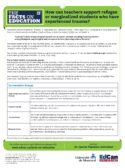How can teachers support refugee or marginalized students who have experienced trauma?
Download the Fact Sheet! (221.78 kB / pdf)
DownloadAdversities such as migrations, diseases, or separation can undermine mental health, especially in young people. According to the Comité de Santé mentale du Québec (Quebec Mental Health Committee) (1989), mental health is:
“a person’s state of psychological equilibrium at a given moment, resulting from interactions among biological, psychological and contextual factors (including cultural factors).”
The mental health of students, their families and school stakeholders is dynamic and complex and varies by context. As one of the most important settings in a young person’s life, schools can provide a supportive environment for mental health promotion through a variety of group activities.
One of these activities concerns the classroom group and can be led by the teacher. These are conversation groups conducted in school settings (Papazian-Zohrabian, G. et al. 2017, 2019).
The principle behind conversation groups
The development of students’ well-being and the promotion of their mental health are fostered when students can express and work with their grief and other emotions, and by the symbolization of traumatic experiences. The ability to freely and safely express one’s history, identity, culture and beliefs contributes to building a positive meaning in life. Allowing students of all ages to express themselves by offering them a neutral and caring ear gives them an opportunity to have a true and authentic voice within their school and to develop positive interpersonal relationships characterized by empathy and knowledge of self and others.
The conversation group is an inclusive collective activity carried out with all the students in a classroom group; it highlights the contribution that teachers can make to promoting the mental health of their students.
Conversation Groups
|
Organizing Conversation Groups |
Conversation groups should preferably be incorporated into the class schedule as a regular feature. It is the consistency of the activity that will contribute to the development of a sense of security and trust between students and facilitators. The activity as a whole and each individual meeting are framed by opening and closing rituals designed to distinguish them from the learning activities. |
|
Topics Covered |
The topics addressed sometimes concern sensitive subjects such as travel, migration, differences, family, faith, identity, violence, war, life or death. |
|
Prerequisites |
The conditions that have been put in place help to ensure that the sessions run smoothly and in compliance with the rules, e.g. effective classroom management, a positive educational relationship, the absence of major conflicts within the classroom group, and sufficient proficiency in the language of instruction. |
|
Principal Rules |
The basic rules to apply are freedom of expression, respect for confidentiality and a non-critical and caring attitude. These rules create a secure context for freely expressing emotions, sharing experiences, processing grief and trauma, and developing well-being. |
Additional information and resources
Comité de santé mentale du Québec. (1989). Présentation : La politique de santé mentale : Une politique de gestion des services. Santé mentale au Québec, 14(1), 7-10.
Papazian-Zohrabian, G. (2015). Les enfants traumatisés et endeuillés par la guerre. In C. Fawer Caputo and Mr. Julier-Costes (eds.), La mort à l’école. Annoncer, accueillir, accompagner (pp. 249-270). De Boeck Supérieur.
Papazian-Zohrabian, G. (2016). Les enfants de la guerre et jeunes réfugiés à l’école québécoise. In M. Potvin and M.-O. Magnan (eds.). L’éducation en contexte de diversité (pp.163-178). Éditions Fides.
Papazian-Zohrabian, G., Lemire, V., et al. (2017). Mener des groupes de parole en contexte scolaire : guide pour les enseignants et les professionnels. Centre d’intervention pédagogique en contexte de diversité de la Commission scolaire Marguerite-Bourgeoys. https://sherpa-recherche.com/wp-content/uploads/Mener-des-groupes-de-parole-en-contexte-scolaire.pdf
Papazian-Zohrabian, G., Mamprin, C., & Lemire, V. (2019). Discussion groups in schools: a space for developing the psychological well-being of young refugees. Revue Québécoise de Psychologie, Thematic Issue, Fall 2019.

